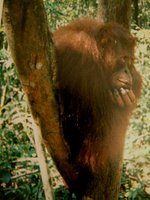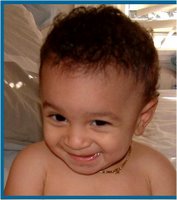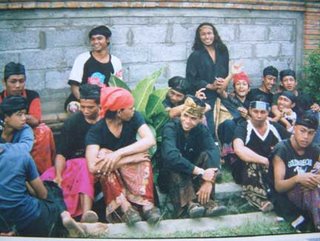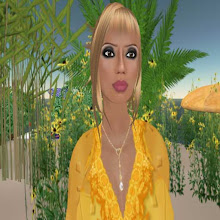Odalan at the Lake, Part I (Bali)
I just returned from dropping off a packages for Aileen and Leger to take to friends in Bali. Whenever any of my San Francisco Bay Area/Bali group friends go to Bali, we take gifts and mementos for friends and relatives of the others. Sitting at dinner with Aileen and Leger and their two children, I remembered the last time we were in Bali together. At that time their daughter, now six, was only a year and a half. Their son had not yet been imagined. What I particularly remember about those few months is the odalan at the lake.
Leger is from mountainous Kintamani, where every year there is a huge celebration for the anniversary (odalan) of an important temple on the shores of Lake Batur. Thousands gather from villages all around the lake for a three-day ceremony and festival. Everyone camps there for the entire time, building temporary bamboo structures from which they hang blankets and grasses, creating a Baliense Arabian nights village of tents. That year, Leger, ever adaptable, put up two large Target tents he had brought with him from San Francisco. Those tents were the envy of the ceremony.
I drove up to the ceremony from Ubud with my friend, Wayan, and when I arrived, I found Leger's family busily setting up their make-shift tents. I knew Leger's extended family very well from years of carrying letters and photos back and forth between San Francisco and Bali. Even when I had no letters, I often stopped in to visit Leger's parents, his stylish brother, Ketut, Ketut's beautiful wife and their little son. I adored Leger's charming, younger sister, Putuh, who had lived with Aileen and Leger in San Francisco the year after their daughter was born. She had returned to Bali not six months before, married her childhood sweetheart and moved to Lovina. Of course, they were both at the ceremony. It was like old home week to hang with Putuh and Ketut; I had known them both for years, long before either was married, and we had some catching up to do.
It was July, but it was very cold at night. I remember sitting by lantern-light in front of one of the dozens of little warungs that sprang up around the camp, sipping hot coffee to warm up. Ketut was so cold he wore a parka over his sarong, as did many, many others. Wayan, Leger and Ketut decided to go gambling, as there are always hot games going on at these things. I headed in the same general direction to buy a fleece-lined jacket from one of the many clothing vendors. If you are getting the picture of a large, vibrant community socializing in this city of tents, that's what it was, and what it is every year.
Aileen, her toddler daughter, her sister-in-law, Putuh, Leger's cousin, Buddhi, and I wandered about the gathering. I looked up now and then to the temple presiding over the lake on volcanic Mt. Batur; when it awakes, Mt. Batur can overflow with fire and death as it had just a few decades before. Natural disasters and tourists (who can impact like a naural disaster) come and go. But this ceremony, this celebration and this gathering were all part of an ancient fabric that wove the Balinese together from time that reached back until it dissolved in dreams.
Despite my study and extended stays in Bali, I don't pretend to have any kind of deep understanding of Balinese culture; I am suspect of foreigners who think they truly understand. Even expats who have lived in Bali for years and have Balinese spouses tell me they feel they are forever pulling back new layers of the onion. But Aileen and I appreciated that the structure of religious ceremonies and community obligatons had kept Balinese culture strong (yet changed) in the face of decades of tourism and a major war. We were startled when occasional frustrated tourists honked their car horns at the milling crowds, as they impatiently tried to drive on the road that ran from further up the lake, through the ceremony and out of the mountains. Where could they be going more important? And how could they have been so out of touch to not notice a tent city arising from the lake shore? Clearly, this was one of the biggest events going on in Bali at the time. But it wasn't in their guidebooks, so they rushed off to see some sight, missing this rich opportunity to share Balinese life.
We walked around, buying pisang goreng (fried bananas) and other treats. Aileen and I had to get Putuh or other Balinese friends to buy them, as the vendors were determined to overcharge us, since we we were "tamu". Usually I can get a decent price when I speak Indonesian while bargaining, and Aileen, with her obviously half-Balinese daughter in tow, even tried bargaining in Balinese, but these people were cut-throat. Batur has a rather hard core reputation for this. We stopped and gambled a few rupiah at simple little games, not as intense as the more high stakes games the guys were playing. The fact is that a lot, and I mean a lot, of Balinese men have major gambling problems, though, of course, others just indulge as occasional entertainment. It can be a grey line.
We came across little girls in red lipstick and golden headresses dancing legong, a performance that in this instance was meant for entertainment rather than temple worship. The refined, small movements, the calculated flashes of the eyes, the fingertip control were all so much more in place here than at the tourist performances, where the audiences jostled for photos. (My friend 'Tut, who I met around this time, had been poor as a child and been made to dance baris at tourist performances. He had hated it.)
We ran into many people we knew, mostly from Kintamani, but many from Lovina. It is not uncommon for people from Kintamani to find jobs in more heavily touristed Lovina, and there is a bit of a symbiotic relationship between the two places. So we talked with a number of people. In Bali, talking with just about anybody means hearing lots of gossip and often becoming the topic of gossip yourself. If you've spent any time at all in Bali, you know the Balinese have got to rank among the world's biggest gossips.
"Hey, I saw you with Wayan!" one young man called to me. I had no idea who he was, but apparently he knew me. "What happened to Made?" he asked leeringly, naming a boyfriend from years before and a different part of the island. I've spent a lot of time in Bali over a lot of years, but having two serious boyfriends over a 10-year period there is the social equivalent of having 30 flings in a one-year period in the States. If you have a boyfriend in Bali, you might as well marry him, because you will never, and I mean literally never, be allowed to forget that relationship. It can feel like the entire island knows your business; it doesn't take much to be scandalous in a society where the women are all but cloistered.
The good thing about Bali: It's community oriented and it seems like everybody knows everybody. The bad thing about Bali: It's community oriented and it seems like everybody knows everybody. Living in Bali is a lot like living in "Mayberry".
This day was for socializing and renewing old bonds. The next day we would enter the temple to pray.
To be continued...
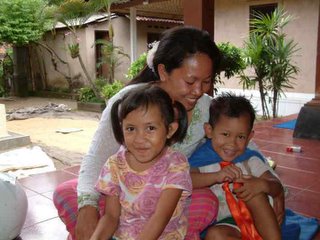 Luhde and Ayu. Luhde and her husband, Wayan, are long-time, steadfast friends. (Spring 2005)
Luhde and Ayu. Luhde and her husband, Wayan, are long-time, steadfast friends. (Spring 2005) Wayan and Agus, who is incognito in his super hero identity (Spring 2005)
Wayan and Agus, who is incognito in his super hero identity (Spring 2005) Luhde and Ayu (Summer 2002)
Luhde and Ayu (Summer 2002)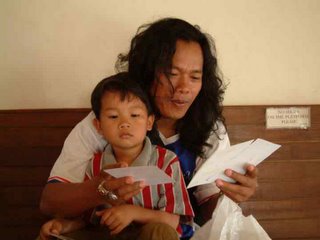 Leger's brother from Kintamani, Ketut, and his son reading letters and viewing photos from Leger and wife Aileen in the States. (Spring 2005)
Leger's brother from Kintamani, Ketut, and his son reading letters and viewing photos from Leger and wife Aileen in the States. (Spring 2005) Friends (1996)
Friends (1996) 'Tut trying on my motorcycle glasses and generally being dorky
'Tut trying on my motorcycle glasses and generally being dorky